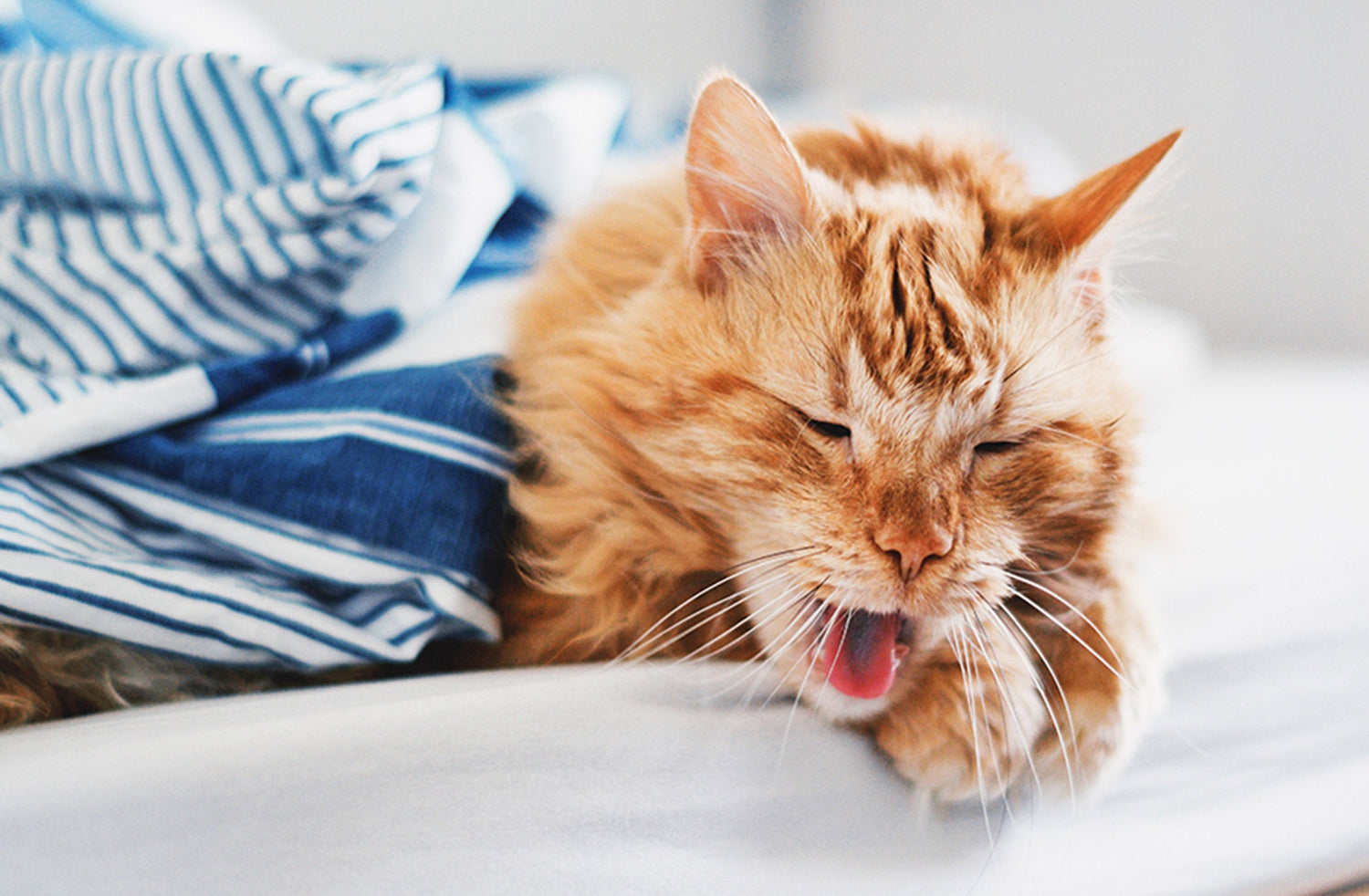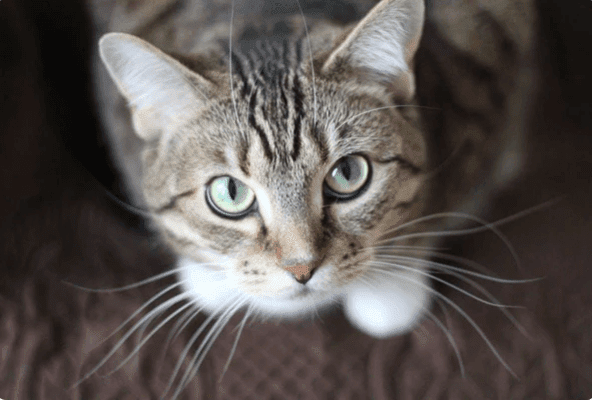Can Cats Get a Cold?
If you've ever had a coughing cat or heard your cat sneezing, you've probably wondered if cats can catch colds. Many Google searches for coughing cat, cat runny nose and cat sneezing take place every year.
According to the CDC, the common cold, for humans, is "a viral infection of your nose and throat." The CDC also reports that, on average, adults have 2-3 colds every year.
But how does this common virus differ from nose and throat related illnesses in felines? And can your cat actually catch a cold?
What is a Cat Cold?
What we often refer to as a "cat cold" is more than likely some type of respiratory infection, either viral or bacterial. According to Pet MD, "'Colds' in cats are usually caused by infection with certain types of viruses.
While there are many conditions that can cause colds, or cold type symptoms, in cats, such as seasonal allergies, asthma, environmental irritants, foreign matter in the nasal passages, chronic infections and cancerous or benign tumors, the most common causes of cold-like symptoms in cats are Feline Herpesvirus and Feline Calicivirus.
Respiratory infections caused by these viruses are usually accompanied by multiple cold symptoms beyond mere coughing and sneezing.
Symptoms of Cat Colds
While any of these symptoms may be a sign of another illness or condition, the following are all common symptoms of cat colds . A cat with a cold may exhibit only one symptom on the list, but, more often, they usually have multiple symptoms.
If you are concerned that your cat may have a cold, particularly one caused by an infectious virus, look for any of the following symptoms.
Coughing
Sneezing
Runny nose
Discharge from eyes
Fever
Loss of appetite
Dehydration
Fatigue
Visible third eyelid
When one or more of these symptoms is present and recurring, it is wise to have your cat examined by a veterinarian to determine the cause.
Causes of Colds in Cats
As previously mentioned, the most common causes of colds in cats are the Feline Herpesvirus (FHV) and Feline Calicivirus (FCV.) As viral infections that attack the upper respiratory system, these conditions can often be much more serious than what we humans endure as the common cold.
Feline Herpesvirus And Feline Calicivirus
Both FHV and FCV are highly contagious and most cats will come into contact with one or both of these viruses at some point. Because FHV and FCV are so easily passed from one animal to another, it's all but impossible to entirely prevent your cat from catching them. However, whether or not your cat contracts either of these cold type illnesses will usually depend on several factors.
Cats that are vaccinated for these illnesses are less likely to contract them. Kittens and young cats, cats that live in shelters or multi-cat homes and cats that go outdoors are most likely to catch these viral infections.
The RSPCA Australia states that these viruses are usually spread "by direct contact between cats (through saliva, tears or nasal discharge), but it can also be spread indirectly, such as via food bowls, bedding, litter trays or human hands."
In an article for VCA Hospitals, Ernest Ward, DVM and Rania Gollakner, BS DVM express that vaccines for both Feline Herpesvirus and Feline Calicivirus are considered core vaccines, and both are recommended by the American Association of Feline Practitioners. However, some cats who have had the vaccines will still contract FHV and FCV.
Other Feline Cold Type Illnesses
Other illnesses that may give your cat cold-like symptoms include, but are not limited to, Chlamydia, Bordetella and Canine Influenza.
Canine Influenza, despite its name, can be a concern for cats. The Miami Herald reports that, "According to the American Veterinary Medical Association, canine influenza, known as dog flu, is a highly contagious viral infection affecting dogs and also cats." In the same article, author Howard Cohen states, if your cat has dog flu, a strain of the H3N2 virus, you may notice symptoms like "lip smacking and excessive salivation."
Chlamydia and Bordetella are two different types of fungal infections that can cause cold symptoms in cats. Both of these bacterial infections are spread easily from cat to cat, and they can also be transmitted by human contact or by contact with an object, like a food bowl or blanket, that has been contaminated by the bacteria.
According to Blue Cross For Pets, Bordetella "is the agent that causes kennel cough in dogs." A bacterial infection caused by Bordetella may also cause stress on a cat’s lungs and additional symptoms beyond those listed above, like wheezing, retching and pneumonia.
MERCK Animal Health states that Feline Chlamydia "primarily causes conjunctivitis, inflammation of the membrane lining the eyelid." But Pet MD reports that the Chlamydia bacteria may also result in similar cold-like symptoms that show in cases of FHV and FCV.
Treatments for Cats with Colds
How do you know when it's time for treatment?
According to the Healthy Pets With Dr. Karen Becker department of Mercola, "if a cat’s sneezing or nasal discharge comes on suddenly, seems unusually severe, or keeps coming back, it’s time for a visit to the veterinarian."
So, you've decide to bring your sick cat to the vet to treat cat sneezing, cat coughing, cat runny nose or some of the other symptoms listed above. While you'll probably be put at ease simply by making a vet appointment, you might still be wondering what you can expect as far as treatments go.
Traditional Cat Respiratory Medicine Treatments
Many viral and bacterial infections in cats are traditionally treated with antibiotics or antiviral medications. Most of the time, these medicines are administered orally, although a vet may also prescribe topical creams and eye drops for eye-related symptoms like conjunctivitis.
Famciclovir is one of the most common oral antiviral medicines prescribed by veterinarians, although there is open conjecture as to whether this medicine is effective. Acyclovir, Ganciclovir and Valacyclovir are other antiviral medications used to treat FHV, according to an article by S. M. Thomasy and D. J. Maggs provided by The National Center for Biotechnology Information. Idoxuridine, Vidarabine, Trifluridine and Cidofovir are topical antivirals mentioned in the same peer-reviewed manuscript.
If a cat's cold is caused by FHV, or certain other viruses, it is important to remember that these medications can only treat the symptoms. Fetch by Web MD states that, "With medication, good nutrition and tender loving care, most cats will make a successful recovery."
It's also important to note that many medications used to treat cats with cold type illnesses are forms of medication developed for humans. According to The Veterinary Information Network, "No antiviral agent has been developed for cats" and these drugs "are not predictably non-toxic when administered to cats."
Natural and Alternative Treatments for Cat Respiratory Problems
Since treatments for cat colds are often only used to treat symptoms, not as a cure, this leaves a lot of room for natural and alternative treatments. Herbal and supplemental treatments are a great place to start if you want to boost your cat's immune system, either to prevent illness or to treat symptoms.
A general immunity booster pill, like our Immunity Boost for Cats, can be a good way to supplement your kitty's nutrition with all natural herbal components to aid in prevention of many common illnesses.
Breathe Easy Respiratory Support for Cats is another natural alternative for treating cold symptoms in cats. This formula was developed specifically to ease symptoms related to colds, flu and fever in cats.


